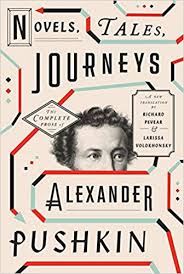James Meek at the LRB:
 The truth, as strongly suggested in Eugene Onegin, is that Pushkin’s attitudes towards the country were as conflicted as the twin self the novel in verse projects. When he stayed at Mikhailovskoye after graduating from his elite Petersburg lycée he was both delighted and impatient. ‘I remember how happy I was with village life, Russian baths, strawberries and so on,’ he wrote. ‘But all this did not please me for long.’ In the country he was constantly riding out to find companionship, love and sex among his gentry neighbours – failing that, to have sex with one of the family serfs – but still had time enough for composition. In one three-month autumn stay in Boldino, where he was less desperate for company – just engaged, but without his future wife, Natalya Goncharova – he wrote thirty poems, all five Tales of Belkin and the satirical History of the Village of Goryukhino. He also wrote the ending of Eugene Onegin and four short plays, including Mozart and Salieri, the work by which he is – invisibly – best known to modern popular culture outside Russia, via the Peter Shaffer play it inspired, Amadeus, rendered onto the big screen by Miloš Forman.
The truth, as strongly suggested in Eugene Onegin, is that Pushkin’s attitudes towards the country were as conflicted as the twin self the novel in verse projects. When he stayed at Mikhailovskoye after graduating from his elite Petersburg lycée he was both delighted and impatient. ‘I remember how happy I was with village life, Russian baths, strawberries and so on,’ he wrote. ‘But all this did not please me for long.’ In the country he was constantly riding out to find companionship, love and sex among his gentry neighbours – failing that, to have sex with one of the family serfs – but still had time enough for composition. In one three-month autumn stay in Boldino, where he was less desperate for company – just engaged, but without his future wife, Natalya Goncharova – he wrote thirty poems, all five Tales of Belkin and the satirical History of the Village of Goryukhino. He also wrote the ending of Eugene Onegin and four short plays, including Mozart and Salieri, the work by which he is – invisibly – best known to modern popular culture outside Russia, via the Peter Shaffer play it inspired, Amadeus, rendered onto the big screen by Miloš Forman.
more here.
